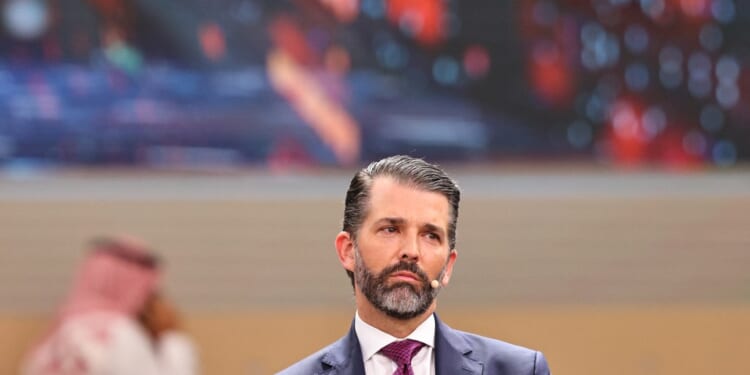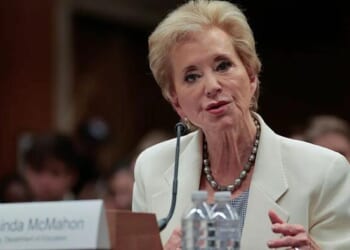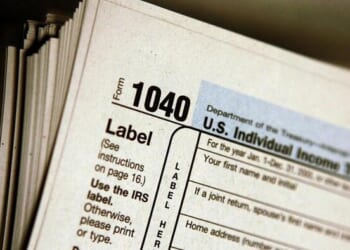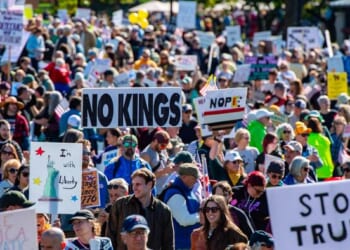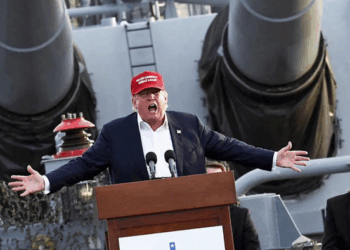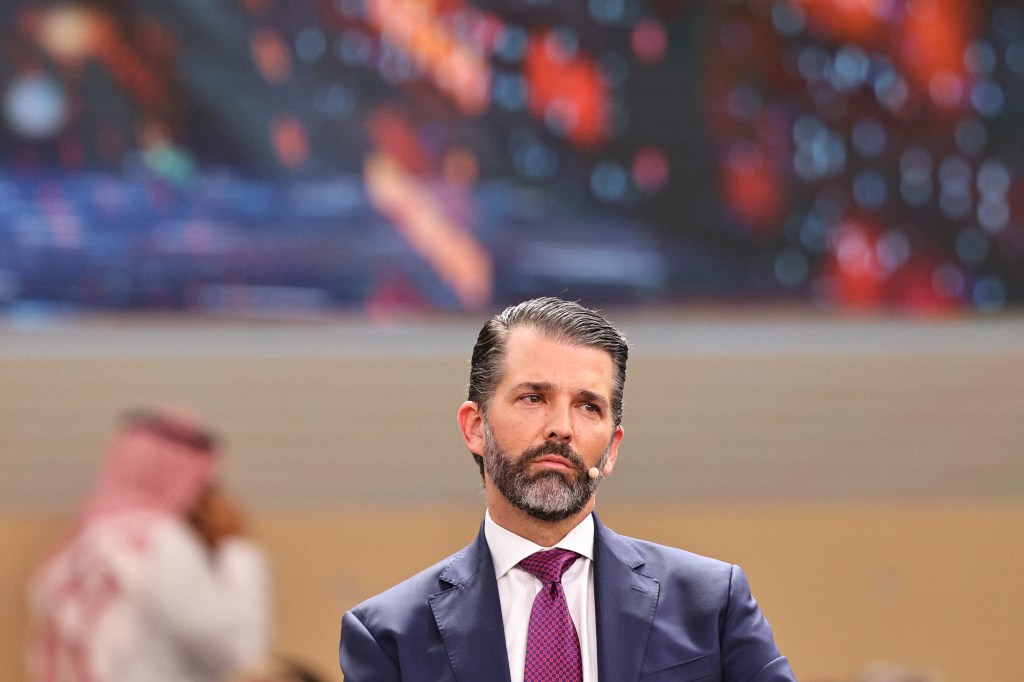
In the 1980s and ’90s, Atlantic City’s sprawling boardwalk was illuminated by the neon red letters of three Trump-backed casinos: the Trump Plaza, Trump Taj Mahal, and Trump World’s Fair. But while Donald Trump’s once-prominent gambling empire has since gone nothing short of bust, the Trump family is once again betting big on betting.
Last month, Trump Media & Technology Group announced that it would be introducing prediction markets to its Truth Social platform, allowing users of the president’s flagship social media app to gamble on everything from the score of an NFL game to who will win control of Congress in the midterm elections. The move comes as one of the president’s sons, Donald Trump Jr., has invested in and allied himself with some of the country’s largest operating prediction markets.
Like his family’s extensive investments into the cryptocurrency industry, the president’s foray into online gambling and prediction markets presents a clear opportunity for Trump-controlled entities to reap financial rewards from presidential decision-making, adding to a growing list of potential conflicts of interest in regulatory matters throughout the administration.
There are close parallels between recent evolutions in the cryptocurrency industry and the world of online betting and prediction markets. Like the cryptocurrency exchanges that faced substantial legal antagonism during the Biden administration through Department of Justice and Securities and Exchange Commission (SEC) investigations, prediction market providers like Polymarket and Kalshi found themselves fighting an uphill battle against an administration that largely sought to regulate the emergent industry through aggressive prosecution rather than through legislative rulemaking.
During the Biden administration, the Commodity Futures Trading Commission (CFTC) believed that it should be the “primary cop” on the cryptocurrency and blockchain beat, and during that period began an investigation into whether New York-based Polymarket illegally offered unregistered financial products to U.S. users. In a resulting 2022 settlement with the CFTC, Polymarket was barred from offering event-based betting contracts to customers in the U.S. and agreed to largely wind down its U.S. operations. A year later, the CFTC similarly barred prediction market provider Kalshi from offering betting contracts on congressional elections, leading the company to sue the agency in the U.S. District Court for the District of Columbia. The court vacated the CFTC’s decision in October 2024, opening up the federal regulatory environment for prediction market providers. The regulatory winds are now blowing in a very different direction under the Trump administration.
Since Trump’s return to the White House, the Department of Justice and CFTC also dropped their respective investigations into Polymarket, putting an end to probes into whether the company was still allowing U.S. users access to its prediction markets. The move mirrored a series of decisions by the Department of Justice and the SEC to drop prosecution actions against cryptocurrency firms, as well as the presidential pardon given to Changpeng Zhao, founder of the Binance crypto exchange.
Similar to the Trump family’s growing cryptocurrency empire, most of Trump family’s involvement in prediction markets stems indirectly from Donald Trump Jr., the president’s oldest son. In January, only a week before Trump’s inauguration, Trump Jr. was named by Kalshi as a “strategic adviser” to the firm, with the company crediting his “extensive business experience and influence” as the reason for the appointment. Kalshi is one of a slew of companies that Trump Jr. joined as an adviser, board member, or consultant in the months surrounding his father’s election victory and return to the White House. It is unclear whether or to what extent Kalshi is compensating Trump Jr. for his advisory role, but advisers are usually paid via some combination of salary and company equity, theoretically giving the president’s son a direct financial interest in Kalshi’s success.
In August, Trump Jr. was also named as an adviser to Kalshi’s rival, Polymarket, after 1789 Capital—a venture capital firm in which Trump Jr. is a partner—invested an amount, reportedly in the double-digit millions, into the company. The investment took place only a month after the DOJ and CFTC dropped investigations into Polymarket, a move that contributed to the prediction market provider’s plans to return to the U.S. market as soon as this month.
As a result of Donald Trump Jr.’s advisory roles with Kalshi and Polymarket, the president’s son now has the opportunity to benefit financially from the growth of an industry that’s current regulatory authority rests almost entirely in an agency—the CFTC—led by a presidentially appointed chair. Trump initially nominated former CFTC Commissioner Brian Quintenz—a pro-crypto regulator who also served on the board of Kalshi—to the position. But the White House withdrew the nomination following pushback from some in the crypto industry, including Tyler and Cameron Winklevoss, owners of the crypto exchange Gemini, who did not believe Quintenz was sufficiently supportive of the president’s agenda. In October, Trump nominated Michael Selig, chief counsel for the SEC’s crypto task force, to the position.
While relatives of the president are not restricted from participating in business activities, some ethics watchdogs are uncomfortable with the extent to which the president’s family is participating in industries that are being directly shaped by presidential decision-making. “Being at the cutting edge of a virtual industry whose legality in the United States is unclear and depends on who is appointed to the CFTC, that is about the highest end possible of the interconnection between an investment and who is president,” Jeff Hauser, executive director of the Revolving Door Project, told The Dispatch.
Hauser said the problem is not necessarily that Trump’s family is engaging in business and investment activities—requiring every family member of a president or Cabinet member to withdraw from the economy is not a necessary or reasonable expectation. But when those family members are active in new industries that are being actively shaped by executive branch policy, the interest in avoiding conflicts of interest is much higher. “Family members are entitled to participate in our market-based economy, but I think there’s an interest in people staying as far away from the highest end of involvement if possible, and it is particularly important they stay away if they have not been there for a very long time,” Hauser said. “If the Trump kids had been involved in prediction markets since before their dad declared for president in 2015, that would mean that they’re still very involved in an industry that is the subject of contemporary politics, but at least you can be like, ‘Well, they’ve invested a lot of time in it, and it’s kind of unfair to make them abandon those efforts.’”
While the Trump family has a long-standing position in the real estate industry, its entry into the nascent crypto and predictions market businesses just as Donald Trump returned to office appears to some as an opportunistic attempt to benefit financially from his political power. “[Trump Jr.] entered this space that was obviously political at a time in which his father was going to be exercising influence over it,” Hauser said. “So, it looks about as bad as possible.”
A source close to Trump Jr. disputed that there was a legitimate conflict of interest, telling The Dispatch that “None of [Trump Jr.’s] roles with any of these companies have anything to do with interfacing with the government.” But even if the president’s son isn’t actively negotiating with the administration on behalf of companies he represents, opportunities for conflicts of interest still exist. “You don’t have to make a very explicit ask for a message to be conveyed,” Jordan Libowitz, vice president for communications at the Campaign for Responsibility and Ethics in Washington, told The Dispatch. “We don’t know what is happening, and I’m not accusing Don Jr. of anything specific, but saying, ‘Well, he didn’t explicitly ask for this action to be taken, it just happened to be taken, which helps him’ … You don’t want those kinds of questions in general.”
With Truth Social’s October announcement that it would be launching prediction markets on the social media platform, it is no longer just Trump Jr. who stands to benefit financially from the president’s regulatory authority over prediction markets, but the president himself. Truth Social, using a technology called “Truth Predict,” will allow users of the president’s social media platform to make bets on major events, including election outcomes, using cryptocurrency exchange Crypto.com’s native token. Through a revocable trust of which he is the sole beneficiary, Trump holds approximately 53 percent of Trump Media & Technology Group, which in turn owns and operates Truth Social.
The value of Trump Media & Technology Group, which also became a Bitcoin treasury after accumulating around $2 billion of the cryptocurrency in July, is now tied directly to the fortunes of two of the industries where President Trump exercises the broadest regulatory authority. And even if there is no direct evidence of Trump or his son actively leveraging political power for profit, the close ties between the family’s political and financial interests still create a damaging public perception of unethical behavior.
“Public service is a sacrifice, and the perception of a conflict of interest can be just as bad as a conflict itself,” Libowitz said. “Even though the criminal conflict of interest statute does not apply to a president, having people lose faith in the administration if they think the president is profiteering is just as bad for them.” Hauser agreed, telling The Dispatch that the administration’s unwillingness to follow traditional ethics norms is contributing to a broader lack of faith in institutions. “It just undermines respect for the rule of law,” Hauser said.
Beyond the president’s deep involvement in crypto, Truth Social’s embrace of prediction markets presents an even more complex ethical question than usual. By allowing users to actively bet on decisions that the administration takes, Truth Predict presents an opportunity for the Trump family to make money off of bets and predictions on their own actions. “Every administration has family members who attempt to make money off of their name or connections, whether real or imagined, but I can’t think of one where they are involved in a business that does something like the predictive markets—where their profit is tied to betting on actions taken by the administration,” Libowitz said. “It is a level of grifting we have never seen before.”

